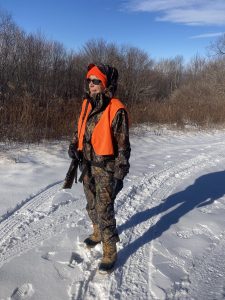Why Do We Hunt?

By Ken Baer
This is something that I have pondered before. With the recent happenings at the statehouse and after reading in V. Paul’s article last month, Paul asked this specific question. I decided it was time for me to answer it. There are many reasons why we hunt, but only so many can fit into this article, I needed to whittle it down.
My father is a biologist. I grew up hearing about biology and all living things, naturally I came to understand it. We all live as part of nature. Nature is built by Mother Earth and the Creator. We are all part of that cycle. Whether today’s society likes that or not, you can not get away from it. All things have evolved over billions of millenniums. Being part of that, we evolved as predators, “an organism that primarily obtains food by the killing and consuming of other organisms.“ This is built into the genitic sequence. Only the fittest survive. Those that learned how to hunt survived, those that didn’t died. The ones that survived passed on their genes, down to even the smallest predator. This created a drive to hunt to survive. This “drive” is stored in the most primitive part of the brain,the reptilian part of the brain in the stem, the oldest part of the brain and it controls basic survival functions. My first answer to the question is “Basic survival instinct.” It drives me to the woods, it is ingrained in me, it is part of my genetic makeup. I must do it to fulfill a primordial urge.
The Solitude
I like the peace. I like to hear the sun come up and go down. It clears the mind. Sitting on a stand in the early morning before the sun comes up, the woods are quiet. As it starts to get light the woods come alive. It is a good day when you start to hear nature return from the dark. The birds come out and flicker about. If you know how, you can call in the chickadees and have them land on you. A keen eye will pick out the movement of the forest critters. A chipmunk might stir you as it rummages through the forest litter looking for breakfast. A flock of turkeys may amble by. Or you might catch a glimpse of a fox as it hunts its way along a stone wall. All the while the perturbation of everyday life gets flushed away. We relax. Nothing matters. I was able to bow hunt Caribou in Alaska with my father. We spent ten days hunting inside the Arctic Circle, but we were not successful. I will quote my father about something he told me at the end of our trip. He said, “It was about nothing but the hunt.” For ten days we lived on the tundra, we spoke of nothing but of that day’s hunting experience and what our plan was for the next day. We spoke of nothing else. The tundra is extremely quiet and you are alone. In one of the most brutal environments in nature, it is peaceful.
Mentors
Family. Mentors. Growth. Camaraderie. I grew up in a hunting family. Both sides hunt. As a child I would dream about the day I would be able to accompany my family members afield to hunt. I spent hours in the woods behind my parents house with my pellet gun stalking all kinds of prey, practicing for the day it would become real. Then one day it happened. My parents’ neighbor, Ed Berube, came over to my father while we were working in the garden. He said to my dad, “ I want to take the boy to Vermont hunting this fall, we will bow hunt in October then rifle hunt in November.” I replied, “I don’t shoot a bow.” He said “ No problem, I will teach you, and I have an old bow I will give you. You can work off the price of the bow while working for me in the yard.” That was the end of the conversation. I started hunting that fall and haven’t missed a season since. At 94, I still hunt with Ed. In doing so, I “grew up” in an ‘A’ frame in Dover,Vermont. It helped to teach me about life. Listening to stories old and new. Several of those men became my mentors and friends. Now it is my turn to pass along the knowledge and skill to others. It is enjoyable to see a smile come across a young hunter’s face as they approach their first downed deer. It is fun to watch a panicked youngster realize they made it when they see you on stand after walking through unfamiliar woods. It builds character and confidence and teaches them to rely on themselves at times. The camaraderie just happens. When you spend a lifetime hunting with a family, it grows support for one another. It builds friendships and social support structures. Hunting is a natural social aspect to life.
These things that drive me to hunt I find I have no control over, it is a natural state. I try to roll with what my natural instincts to survive tell me to do. All these parts rolled into hunting release endorphins, nature’s way of operant conditioning and perpetuating the species. I will not fight Mother Earth and the Creator.
Take that kid out, talk to them about the natural state of life and how it works. Let them know about the importance of living within nature and not outside it.
For more articles about hunting, fishing and the great outdoors be sure to subscribe to the Northwoods Sporting Journal.
